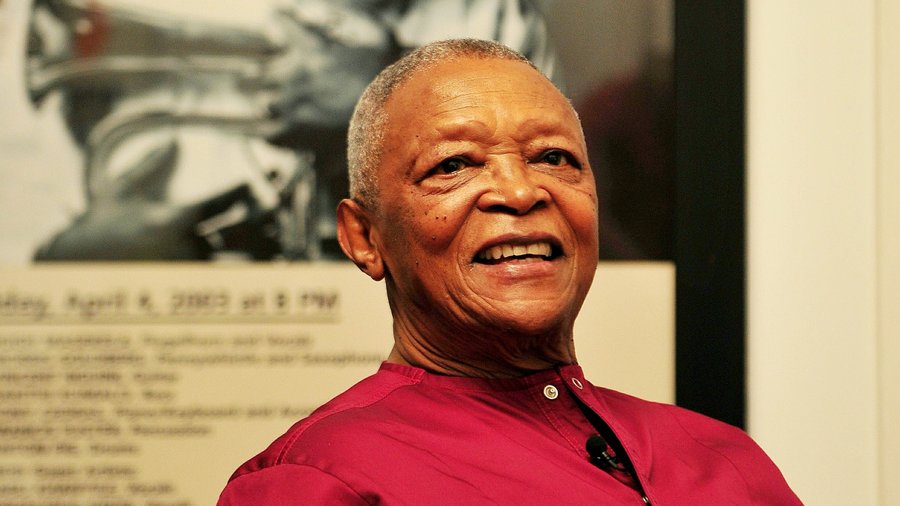posted by Robert J. Carmack
It seems that a bevy of greats have left the stage and building since January of 2017. I realize that’s just life as we know it. Nothing to say about it case closed. However, I did not want to allow the sudden death of a great man and musician go by without saying anything about it. First, my exposure to Hugh Masakela goes back beyond 50 years(1966). I lived in Los Angeles and was studying music in high school and two off campus jazz bands too. Soon summer 1966 arrived and I was quite anxious because, word had it, the very first WATTS FESTIVAL was coming to reality. Heavy announcements of Music, Art and Pageantry to replace all the violence and melee that happened only one year prior. 
The opening act was this new guy we had been hearing about from Africa that was making a lot of noise in New York.
Hugh Masakela was the Kick-off concert at Jordan High school gym that launched the 1966 Watts Festival & Cultural events. I can remember like yesterday as me and a group of guys who loved jazz, was quite excited about the possibilities and the fact it would be my first time seeing anyone from Africa that was not a cliché of Hollywood racists attitudes about portraying ,anyone from the motherland. That night was very special in more ways than the obvious. I was 16 and thought I was a grown man…the other was coming from a sociopolitical viewpoint. Black people were making a transition from being negro or colored people to Black people or Afro-American (first popped up as a description of black people at this time). Anyway, back to the music, Hugh was every bit an image and role model for us young men. he had a very interesting hair-style or “Natural”, wore full African regalia, including “NO Shoes” as he went through the recently released album cuts of 1966 “The Americanization of Ooga-Booga.” Which I know now, was a title given and sanctioned by the marketing department at the record company. I assure you, mine and most of us were concentrating on the musical style of his trumpet playing and the rhythms being crafted by the unit led by Hugh. Larry Willis on piano, Henry Jenkins on Drums, Henry Franklin on Bass and Percussionist Big Black pounding out the beats on African drums and Congas.
Hugh was a master of blending the American style of jazz bop and blues idioms juxtaposition with African Rhythms. The eclectic mix of originals showcased his masterful composing skills . He introduced a whole generation of black folks and others to “South-Africanized” jazz. which was quite different in what we had heard by Dizzy Gillespie, Art Blakeley or Randy Weston and their interpretations. He was bringing it “Straight with No Chaser”.
Some of the highlights of the evening’s performances was a composition by Herbie Hancock, Cantaloupe Island. Two other originals jumped out at the crowd which spawn several standing  ovations when they ended.. Hale Se Di Li Kanna(the Dowry song) and Bajabula Bonke (the Healing Song).
ovations when they ended.. Hale Se Di Li Kanna(the Dowry song) and Bajabula Bonke (the Healing Song).
The influence of Dizzy Gillespie and Freddie Hubbard can be heard, along with McCoy Tyner in the playing of pianist Larry Willis, and he shows his debt to John Coltrane as an inspiration on “Mixolydia” as well as his affinity for Brazilian music on “Mas Que Nada.” But the core sound was what Masekela called “township bop” — his short trumpet bursts, sometimes seemingly approaching micro-tonal territory, are engrossing celebrations of the melodies of his repertory, which is mostly of South African origin. The buzz after the concert was so loud and the cultural wave became a Tsunami of positive vibes for brother Hugh as he was affectionately called after that night. 
By the fall ,I was still hearing rumblings about that summer concert.. only to find out that the very same group was scheduled to perform at our school sometime before the Christmas break. Man! what a blessing! Twice in less than two months. By the time they appeared at our school, most of us was sporting Naturals and wearing sandals, some even wore traditional Dashiki garb and begun learning more about the continent of Africa, particularly, South Africa. I became a life long Hugh Fan, even as he became more and more commercial in his albums, he always brought it back home with a solid menu of fan favorites like Bajabula Bonke, and Cantaloupe Island at the Live concerts.
I will always believe to my dying breath, he believed he was put here to bring joy from the motherland and shine a light on freedom and respect for every one. His Nelson Mandela anthem (Bring him back Home) was globally huge and played a strong role in keeping the fire to the feet of the world powers. I know I will miss him and his musical spirit, but the whole world will miss his humanity. Rest in Heavenly Peace Brother Hugh! 
Thanks for this excellent essay, Robert.
LikeLike
What a wonderful recollection of a talented and phenomenal musician. Thanks for sharing.
LikeLiked by 1 person
Are you guys back open again.. lets talk about an exciting tribute show I have in mind regarding a Hugh masakela tribute with music poetry. I think you will love it contact me at 951-840-7120… also send me a email and i will send you an invitation for a play i’m doing march 3rd in los angeles at world stage in Leimert park. I will comp you of course
LikeLike
Hey There Mr. Carmack,
Not yet open, but will definitely keep you in the loop of the opening.
Would love to see you on the 3rd of March- but will be in the Bay Area.
Definitely keep in touch.
LikeLike